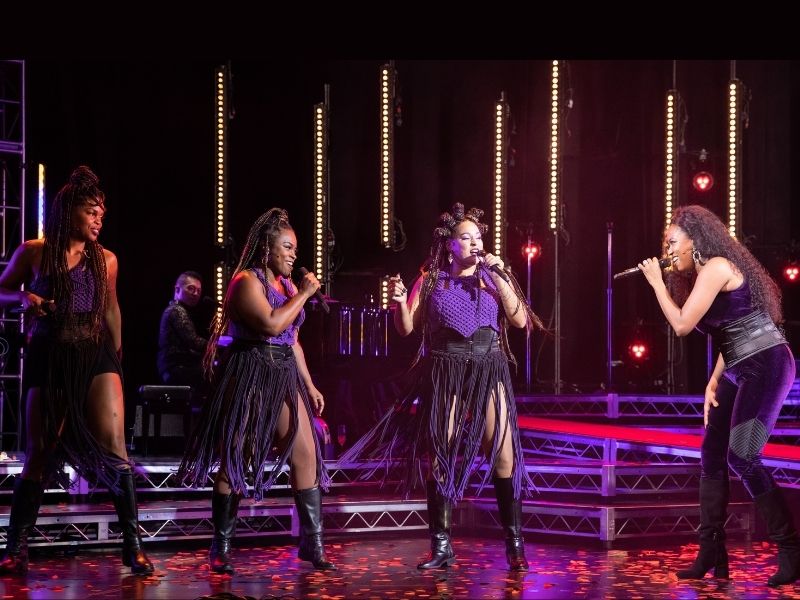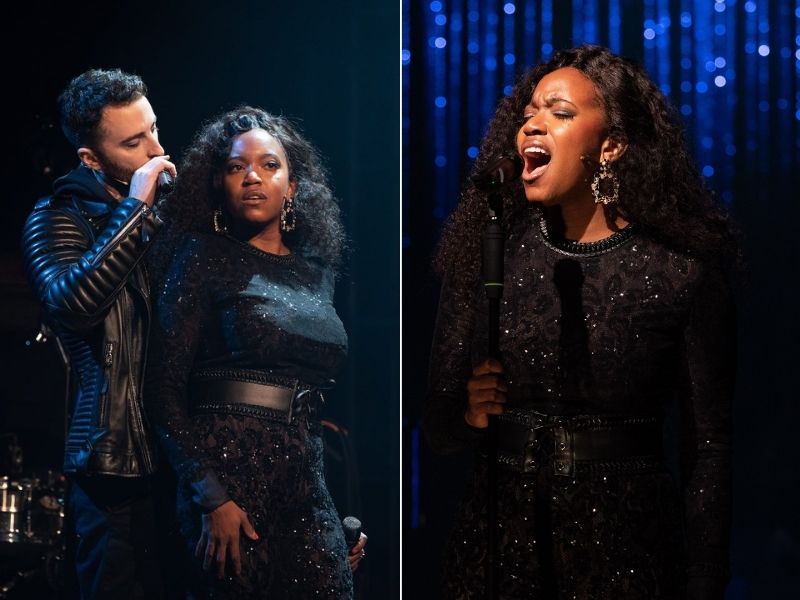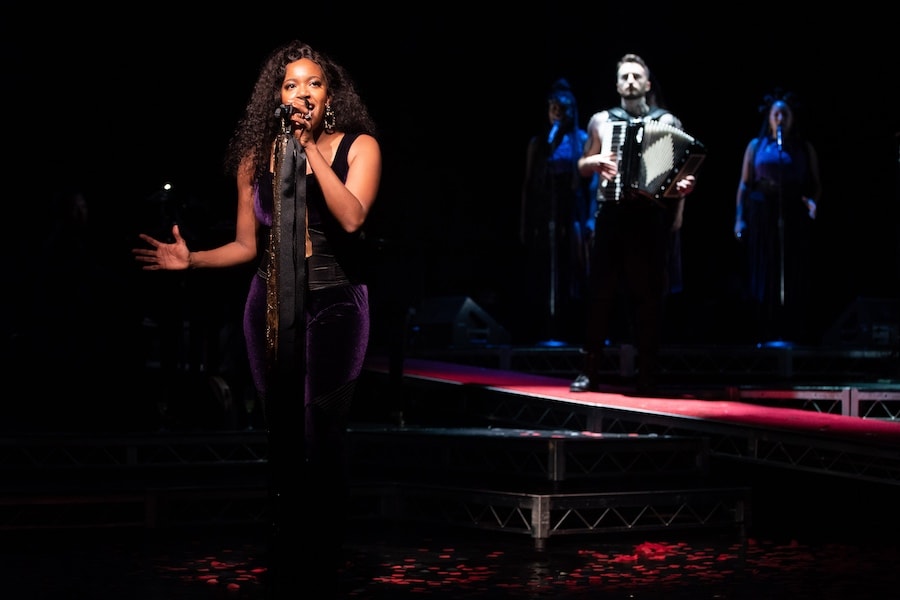William Shakespeare: look out. You have some explaining to do. Whitney White has deconstructed your dead white male hegemony on stage, by focusing on one of your greatest female creations: Lady Macbeth. Macbeth in Stride (created and performed by Whitney White, now playing at the Klein) celebrates the power of the Black woman — her ambition, her wit, her sensuality, and her rage. That exaltation of Black women is a wonder to see.
As the show opens, one thing is clear: the music, which is all original, is going to be sensational. Pop, rock, gospel, R&B, many genres are represented, and the score and performances are positively celestial. In many ways, this Macbeth is a rock concert.

The combination of modern and Shakespeare’s language is an exhilarating mix. The choreography, by Raja Feather Kelly, matches the musical appeal at every moment.
Whitney White (as the Woman) and Charlie Thurston (the Man) are Lady Macbeth and Macbeth reimagined. White, appearing first in a tight, sequined jumpsuit, has the kind of stratospheric charm that only the best performers can aspire to. Thurston as the Man is a biker Macbeth, complete with leather jacket and tattoos, and particularly good at showing us the vulnerability underneath the cruel façade.
The scenes from Shakespeare, refreshingly, focus on Lady M. and their marriage. White and Thurston play them beautifully. As the Woman and the Man, they also explore contemporary themes: the desires and needs of the Black woman, the limitations of Shakespeare’s portrayal of women, the nature of manhood, and the struggles of couples everywhere to keep their love alive.
They comment (wryly or by implication) upon the more dated aspects of the plot. Together, they are a charismatic pair.

The Woman is clear about what she wants:
Woman:
LifeRightsPursuitHappiness
Don’t touch my hair
Don’t talk when I’m talking
Don’t cut me in line.
Don’t make me wait
Don’t say there’s too much on my plate
Don’t get the white woman on my case
The Three Witches (Stacey Sargeant, Ximone Rose, and Chelsea Lee Williams) are a dynamite trio. Introduced as backup singers, they are actually far more. They have a terrific rap:
Witches:
Double Double Double and toil and trouble bitch oooh!
Double Double Double toil and trouble!Double Double Double and toil and trouble bitch come on!
Double Double Double toil and trouble!Double Double Double and toil and trouble bitch oooh!
(Double double toil and trouble)
Double Double Double toil and trouble!
(Better git it, better git it girl on the double)Double Double Double And toil and trouble bitch.…come on!
(Double double toil and trouble)
Double Double Double better kill that mother!
(Better git it, better get it, you better kill that mother)
Though each Witch has her own personality, they function as a chorus. The First (Stacey Sargeant) reminds us that Lady Macbeth “isn’t a good person!”
White’s creativity is many-layered; she breaks the fourth wall with enthusiasm. The wants and needs of the characters are shared with all of us. The Woman addresses the audience:
Woman: Let me ask you a question: —Women, queer folk, and othered people out there? What are you willing to do to get what you need? To get what you want?
Second Witch: What are you trying to say?
Woman: I want—
Second Witch: But what is behind the want?
Woman: power. or— I don’t know. I’m sorry.
Directors Tyler Dobrowsky and Taibi Magar, the mega-talented cast, and the phenomenal Band make everything come together. The transitions from here to then are flawlessly executed.
At times, the Woman and the Man seem like a modern married couple, reflected in an ancient (and cracked) mirror. She is annoyed by his hesitation. He embarrasses her in front of their guests. They attempt a grand gesture to save their marriage (in this case, well, murder). It doesn’t work.

Both the modern and the Shakespearean scenes are superb. White’s reimagination of Lady M.’s famous monologue is stunningly original, and her performance takes us into another world. When Thurston admits that he doesn’t know what a man is, we have a window into what might have been underneath Shakespeare’s monstrous tyrant.
But there is one caveat. Macbeth and Lady Macbeth are still, and forever, the “dead butcher and his fiend-like queen.” White’s commentary on Shakespeare, love vs. ambition, oppression, and “othering” are spot on. But in Shakespeare, Lady Macbeth’s ambition is linked to murder. The Woman says, “I’m pretty sure we’re gonna have to kill him.” So, much as I admire the Woman, I feel conflicted. I can’t root for her, and in the end, no matter how I try, I can’t really love her. She’s not Richard III, a fascinating monster. But she’s not an icon I want to empower if she’s willing to murder like Shakespeare’s Lady M. The ethical question “Is it OK to succeed by violence?” though addressed is never resolved.
Still, there is an abundance of visual and aural delight. Whitney White and Steven Cuevas are co-orchestrators. (Cuevas is also music director). Sound designer is Nick Kourtides. The glittering costumes, very much in the rock concert mode, are designed by Qween Jean.
The Band — drummer, bassist guitarist, pianist — plays for us on a set that, like the lighting, looks meant only for music but encompasses much more. (The scenic designer is Daniel Soule; the lighting designer is Jeanette Oi-Suk Yew. Special kudos are due to Wig, Hair, and Makeup Designer Rachel Padula-Shufelt.
White’s production is the first of a five-part series commissioned by the American Repertory Theatre on Shakespeare’s women. Three of them, Juliet, Cleopatra, and Emilia, are mentioned here. We can all look forward to more. Whatever White has to say, it will be essential.
Running Time: 80 minutes with no intermission.
Macbeth in Stride plays through October 28, 2023, at Shakespeare Theatre Company’s Michael R. Klein Theatre (formerly the Lansburgh) – 450 7th Street NW, Washington, DC. F Tickets ($35–$145) are available at the box office, online, or by calling (202) 547-1122. STC offers discounts for military servicepeople, first responders, senior citizens, young people, and neighbors, as well as rush tickets. Contact the Box Office or visit Shakespearetheatre.org/tickets-and-events/special-offers/ for more information. Audio-described and ASL-interpreted performances are also available.
The Asides program for Macbeth in Stride is online here.
COVID Safety: All STC spaces are mask-friendly — meaning all patrons, masks and unmasked, are welcome. Read more about Shakespeare Theatre Company’s Health and Safety policies here.
Macbeth in Stride
CAST
Woman: Whitney White
Man: Charlie Thurston
First Witch: Stacey Sargeant
Second Witch: Ximone Rose
Third Witch: Chelsea Lee Williams
Understudy: Lizzy Brooks, Keith Rubin, Kanshya Williams
Dance Captain: Ximone Rose
ARTISTIC TEAM
Created & Performed by Co-Orchestrator: Whitney White
Choreography by: Raja Feather Kelly
Director: Tyler Dobrowsky, Taibi Magar
Music Director, Co-Orchestrator: Steven Cuevas
Scenic Designer: Daniel Soule
Costume Designer: Qween Jean
Lighting Designer: Jeanette Oi-Suk Yew
Sound Designer: Nick Kourtides
Wig, Hair & Makeup Designer: Rachel Padula-Shufelt
Resident Casting Director: Danica Rodriguez
Production Stage Manager: Charles M. Turner III
Assistant Stage Manager: Samantha Wilheim
BAND
Keyboard/Conductor: Steven Cuevas
Drummer (through Oct. 15): Jordan Carter
Drummer (beginning Oct. 18): Barbara (‘Muzikaldunk’) Duncan
Guitar: DeAnté Haggerty
Bass: Reggie Payne
Keyboard/Conductor Sub: Utsav Bhargava
Contractor: Bruno Nasta
MUSICAL NUMBERS
“Prologue”
“If Knowledge is Power”
“Hallelujah” (Entrance)
“Reach for It”
“Dark World”
“Doll House”
“In the Place of Love”
“If Knowledge is Power/Reach for It” (Reprises)
“Double, Double Toil And Trouble”
“Hallelujah” (Coronation)
“I For You”
“Ghosts of Yesterday”
“Hallelujah” (Finale)




